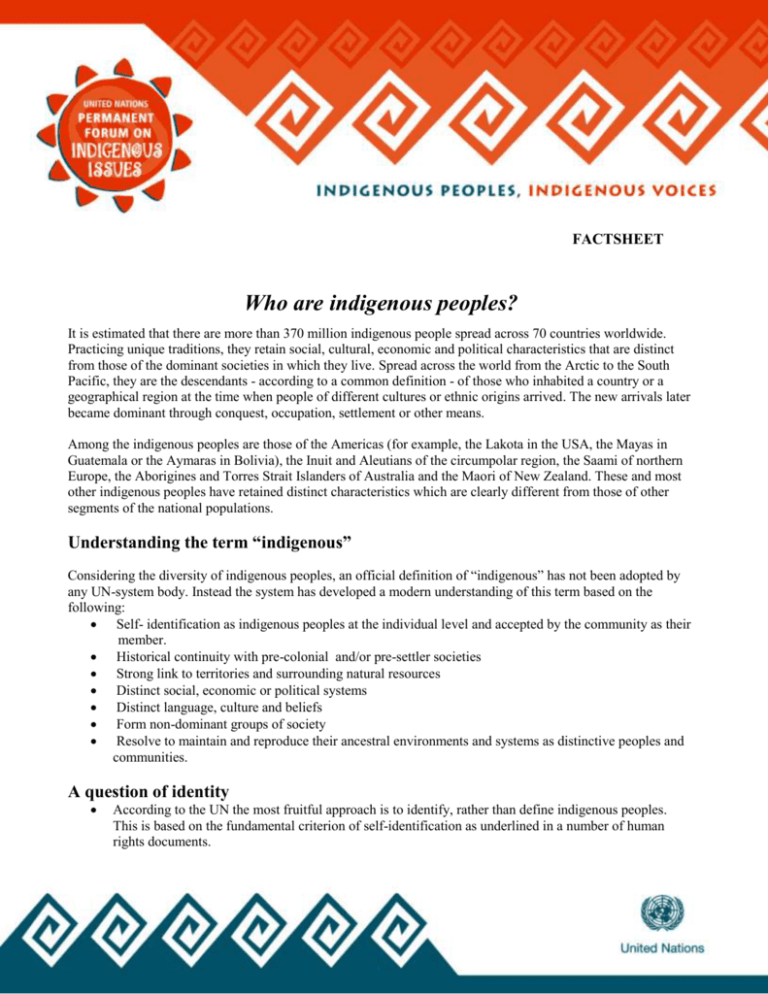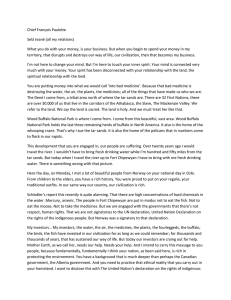5session_pressreleas..
advertisement

FACTSHEET Who are indigenous peoples? It is estimated that there are more than 370 million indigenous people spread across 70 countries worldwide. Practicing unique traditions, they retain social, cultural, economic and political characteristics that are distinct from those of the dominant societies in which they live. Spread across the world from the Arctic to the South Pacific, they are the descendants - according to a common definition - of those who inhabited a country or a geographical region at the time when people of different cultures or ethnic origins arrived. The new arrivals later became dominant through conquest, occupation, settlement or other means. Among the indigenous peoples are those of the Americas (for example, the Lakota in the USA, the Mayas in Guatemala or the Aymaras in Bolivia), the Inuit and Aleutians of the circumpolar region, the Saami of northern Europe, the Aborigines and Torres Strait Islanders of Australia and the Maori of New Zealand. These and most other indigenous peoples have retained distinct characteristics which are clearly different from those of other segments of the national populations. Understanding the term “indigenous” Considering the diversity of indigenous peoples, an official definition of “indigenous” has not been adopted by any UN-system body. Instead the system has developed a modern understanding of this term based on the following: Self- identification as indigenous peoples at the individual level and accepted by the community as their member. Historical continuity with pre-colonial and/or pre-settler societies Strong link to territories and surrounding natural resources Distinct social, economic or political systems Distinct language, culture and beliefs Form non-dominant groups of society Resolve to maintain and reproduce their ancestral environments and systems as distinctive peoples and communities. A question of identity According to the UN the most fruitful approach is to identify, rather than define indigenous peoples. This is based on the fundamental criterion of self-identification as underlined in a number of human rights documents. The term “indigenous” has prevailed as a generic term for many years. In some countries, there may be preference for other terms including tribes, first peoples/nations, aboriginals, ethnic groups, adivasi, janajati. Occupational and geographical terms like hunter-gatherers, nomads, peasants, hill people, etc., also exist and for all practical purposes can be used interchangeably with “indigenous peoples”. In many cases, the notion of being termed “indigenous” has negative connotations and some people may choose not to reveal or define their origin. Others must respect such choices, while at the same time working against the discrimination of indigenous peoples. Culture and Knowledge Indigenous peoples are the holders of unique languages, knowledge systems and beliefs and possess invaluable knowledge of practices for the sustainable management of natural resources. They have a special relation to and use of their traditional land. Their ancestral land has a fundamental importance for their collective physical and cultural survival as peoples. Indigenous peoples hold their own diverse concepts of development, based on their traditional values, visions, needs and priorities. Political participation Indigenous peoples often have much in common with other neglected segments of societies, i.e. lack of political representation and participation, economic marginalization and poverty, lack of access to social services and discrimination. Despite their cultural differences, the diverse indigenous peoples share common problems also related to the protection of their rights. They strive for recognition of their identities, their ways of life and their right to traditional lands, territories and natural resources. For media enquiries or interviews on these issues, please contact: Oisika Chakrabarti, Department of Public Information, tel: 212.963.8264, e-mail: mediainfo@un.org For Secretariat of the Permanent Forum, please contact: Mirian Masaquiza, Secretariat of the Permanent Forum on Indigenous Issues, tel: 917.367.6006, e-mail: IndigenousPermanentForum@un.org








